Terrorism

After my article on the terrorism in Paris last week, readers offered some thoughtful critiques of my position. Their comments zero in on the difficulty inherent in sorting out responsibility for violence without blaming victims or excusing perpetrators. My effort, however flawed, in analyzing this instance of violence had one goal in mind: to discredit our methods for justifying violence. What seems to have elicited the most concern is my use of the image of a dragon to discuss René Girard’s concept of the sacred. I pointed out that the editors at Charles Hebdo unapologetically embraced radical secularism. They believed that sacred structures are not only as dead as a mythical dragon, but that they have no function in modern society. I begged to differ, not because I am a fan of the archaic sacred, as Girard calls it, but because I am extremely concerned that continuing to remain ignorant of the way it functions in modern society is the greatest global threat we face today. Here are four things you need to know about the relationship between the archaic sacred and violence and how that relationship threatens our world:
1. Categorical Confusion
The archaic sacred is also called the false sacred because it generates a world in which false differences appear to be true. We see this dynamic clearly in the actions of terrorists who believe in a false difference between legitimate targets for violence (Western secularists, for example) and victims of violence who must be avenged (their religious and national compatriots). We easily condemn them for justifying their own violence with self-righteous fervor. Trying to expose the difference humans have constructed as categorical lies is the driving force behind our work at the Raven Foundation.
Let me be clear: No human being is a legitimate target for violence, period. To say otherwise is indeed to blame the victim and excuse perpetrators. However, to defend victims of violence by glorifying their deaths or sanctifying the values that apparently got them murdered is to play into the hands of the archaic sacred. Why? Because by explaining why these victims did not deserve to die, we indirectly acknowledge the possibility that some victims might indeed deserve what they get. In other words, the victims of the Paris terrorism are not to be mourned because they were good, noble, or saintly people. It wouldn’t matter if they were liars, cheats, and murderers – no one needs to earn the right to NOT be murdered. To hang on to the difference between those who deserve to die and those who don’t is to hang on in confusion to a false difference that serves only one purpose – to sanctify violence and ensure its continued presence as a plague in our world.

The real war on terror is not a war on Western values or American values. It is evil perpetuating crimes of power and control, and its costs are measured in real in human lives. Those lives are largely black and brown, and the focus on the danger to America with its resulting protectionism and cultural-centrism is endangering lives long term.
Church, let us not join in the narrative of self-preservation. Let us not value those who look and think like our own community more than those who are culturally different. Let us not value the wealthy more than the impoverished. Let justice-speech ring from our pulpits, and let love for the culturally different be reflected in our prayers and our financial endeavors. For the world to hear that in Christ all lives matter, we the Body must speak loudly and demonstrate that #blacklivesmatter #brownlivesmatter.

I love Jon Stewart. I mean, like “maybe jump the fence” love him. His presence on The Daily Show has spoken to and with my generation through some of our most formative years.
And yes, he tells fart jokes (which I also love). And yes, he editorializes, (which is nearly ubiquitous in “legitimate news” streams anyway). But he also often names what people are thinking, feeling, or what they can’t even put into words.
And then he helps us laugh about it, and at ourselves.
On a recent episode of The Daily Show, however, he took a more sober tone when talking about the slaughter in the headquarters of the French satire magazine, Charlie Hebdo. One comment in particular that he made stuck with me, not because it was funny or witty. Rather, it pointed to something we all need to consider more seriously, I think.
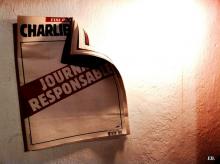
What is the sacred? The sacred has been around since the beginning of human history and, according the great French thinker René Girard, it is the reason humanity has a history at all. Girard defines the sacred in a way that encompasses archaic sacrificial religions and diagnoses modern violence. He contends that the sacred is any belief that creates identity and cohesion within a group over and against outsiders. In others words, the sacred protects a community from its own violence by designating the proper enemies one can hate, ridicule, satirize and kill without remorse. Indeed, to do so is a sacred duty. By hating and killing others, we strengthen our love for members of our own group. If you recognize this as what we now call scapegoating, you are correct.

A horrific attack on a satirical magazine that mocked Islam left 12 people dead on Jan. 7 and put the Muslim community on edge.
The hunt is now on for the assailants, two or three masked men who witnesses and police say opened fire with automatic weapons inside the office of French weekly Charlie Hebdo.
“People are exploiting this one way or another,” said Fateh Kimouche, 38, the founder of Al Kanz, a prominent French Muslim blog.
“The terrorists didn’t distinguish what faith their victims were from. … I just found out that one of the cops killed, his name was Ahmed. Even Muslims aren’t safe.”
The three gunmen who attacked the magazine during an editorial meeting reportedly shouted “Allahu Akbar,” and described themselves as al-Qaida in Yemen. They killed prominent cartoonists, staff members and two police officers in what French officials described as a carefully planned and executed attack.
The French weekly has drawn the ire of Muslims before. Its offices were firebombed in 2011, after a spoof issue skewering Muhammad, the Muslim prophet. A year later, the magazine published crude caricatures of Muhammad, shown naked and in sexual poses. Most Muslims object to any depictions of the prophet, even if reverent.
Reaction — and condemnation — was swift.
Armed with AK-47s and a rocket-launcher, three masked attackers opened fire in the office of a French newspaper, killing two police officers and ten staff. After hijacking a car, the attackers are currently on the run. Parisian authorities are evacuating local schools and guarding other newspaper offices as they scour the city.
According to the Guardian, French President François Hollande has described the shooting as “a terrorist attack, without a doubt” and raised the terror alert in Paris to its highest level. This would not be the first time the magazine was subjected to terrorist attack. In an analysis of Charlie Hebdo’s commitment to satire, the Guardian reports:

Unfortunately, we will not be able to watch Kim Jong-un’s assassination on the big screen this Christmas. We will not be able to cheer as the brutal dictator’s helicopter explodes in the air “ while Katy Perry’s ‘Firework’ plays on the soundtrack.” We will not be able to fulfill this Christmas Day fantasy by watching The Interview because the terrorists have won.
The FBI now claims that Kim Jong-un’s government is behind the act of terrorism. In retaliation for the movie, a state-sponsored North Korean cyber-terrorist group called “The Guardians of Peace” hacked into Sony Pictures and leaked sensitive information, including internal emails, future Sony films, and sensitive employee records. “The Guardians of Peace” also threatened movie goers with a “9/11 style attack” on every cinema that shows the movie.
After the threats were made and many theaters decided to pull the film, Sony Pictures canceled the release of The Interview. Sony said in a statement:
Sony Pictures has been the victim of an unprecedented criminal assault against our employees, our customers, and our business. Those who attacked us stole our intellectual property, private emails, and sensitive and proprietary material, and sought to destroy our spirit and morale – all apparently to thwart the release of a movie they did not like. We are deeply saddened at this brazen effort to suppress the distribution of a movie, and in the process do damage to our company, our employees, and the American public. We stand by our filmmakers and their right to free expression and are extremely disappointed by this outcome.
Washington and Hollywood are also in an uproar:
“Wow. Everyone caved. The hackers won. An utter and complete victory for them,”tweeted Rob Lowe. Jimmy Kimmel claimed that pulling the movie was, “an un-American act of cowardice that validates terrorist actions and sets a terrifying precedent.” Steve Carell said it was a, “Sad day for creative expression.” Sen. John McCain stated “yielding to aggressive cyber-terrorism by North Korea … sets a troubling precedent that will only empower and embolden bad actors to use cyber as an offensive weapon even more aggressively in the future.”
And White House officials are exploring retaliation, saying security leaders “would be mindful of the fact that we need a proportional response.”
The terrorists may have won the battle, but the United States will win the war!

Just over one week after a grand jury elected not to indict Darren Wilson for the killing of Michael Brown, a Staten Island grand jury has cleared an NYPD police officer of any criminal charge in the death of Eric Garner.
The officer, Daniel Pantaleo, a white male, choked Mr. Garner to death as other police officers stomped on his head. Mr. Garner, 43, suffered from asthma and was suspected of illegally selling cigarettes.Along with other evidence, the grand jury viewed a video recorded by bystanders, which fully captured the violent arrest.
Six weeks after ISIS overtook their village outside of Mosul, Iraq, Sief and Jacob Jebrita said they received an official cease and desist letter from the terrorist group saying their work was forbidden under Islamic law. The two brothers, partners in a small photography and videography business, lost their sole source of income. But that was just the beginning.
Sief and Jacob shared their story while sitting in St. Mary, Mother of the Church in Amman, Jordan, with a delegation of religious media. The church, led by Fr. Khalil Jaar, has become home to more than 150 Iraqi Christian refugees who have fled their homes while ISIS continues to push through the region.
Because of their Christian faith, Sief, Jacob, and their families were targeted by ISIS. They told me of a soldier ripping an earring out of a girl’s ear, slicing it open because it was not acceptable for her to wear jewelry. As ISIS militants forced people out of their homes, they would not allow them to bring anything with them at all except the clothes on their backs. They told me the story of one mother walking with her little boy who was forced to leave behind his bottle of milk after a soldier knocked it to the ground and shouted at them. As the situation worsened, they said they saw Yazidi men killed for refusing to accept Islam, and Yazidi woman sold into slavery in Mosul – $500 for younger women and $100 to $300 for older women.

LAST YEAR, as I was unpacking my son’s school backpack, I found the children’s book on the Prophet Muhammad that my wife and I read to him at night. He had brought it to school without telling us. “It was for show and tell,” he explained to me.
You might think that my first reaction would be happiness. One of my goals as a Muslim parent is to help my kids feel connected to their faith. Clearly my son felt close enough to his religion to bring a book on the Prophet to share with his class.
What I actually felt was a shock of fear shoot down my spine. It was an immediate, visceral reaction. A whole slew of questions raced through my head. What did his teacher think of Muslims? What about his classmates? Would somebody say something ugly or bigoted about Islam during my son’s presentation? Would his first taste of Islamophobia come at the age of 5 during show-and-tell?
My fear at that moment is one small window into what it feels like to be a Muslim-American parent at a time when Muslim extremism is on prominent display and Islamophobia in America continues to spread.

Rene Girard has a prophetic warning in his book Battling to the End about the West’s fight against Islamic jihadists:
The West is going to exhaust itself in its fight against Islamic terrorism, which Western arrogance has undeniably kindled.
That Western arrogance was on display last weekend on Real Time with Bill Maher. The tense debate about Islam between Bill Maher, Sam Harris, and Ben Affleck has been shared multiple times over social media and provides a case study in Girard’s mimetic theory.
One element that mimetic theory illuminates in this discussion of Islam is the scapegoat mechanism. Scapegoating is a non-conscious way of reinforcing a group’s relationship by blaming another group of people for our problems. The scapegoating mechanism is non-conscious because we always think that we are innocent and that our scapegoats are guilty. The video below shows a great example of the scapegoating mechanism when it comes to Islam. (Warning: It's an HBO show — there is some foul language.)
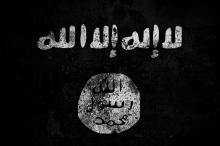
Whether ISIS is "Islamic," or a "state," it is definitely terrifying. As it terrorizes the Levant — killing Muslims, Christians, Jews, Yazidis, and other religious/cultural minorities in Syria and Iraq — and takes the lives of Western journalists, it strikes fear in the hearts of many.
Swirling around the alarming analysis are the rumors and realities of individuals from Europe and the U.S. joining the ranks of ISIS and fighting for their "cause."
The intelligence organization Soufan Group recently released a report stating that fighters from at least 81 countries have traveled to Syria since its three-year conflict began. Hundreds of recruits come from nations like France, Germany, the UK, and the U.S.
Of all the fearful intimations of this conflict, this feature seems to be the most frightening to many in the West. Could it be that my neighbor is a secret jihadi? Are redheads (a "pure" European stock) more prone to terrorism? Are mosques their hideouts? Regardless of the judiciousness of these questions, underlying them all is the question "why?" Why would someone leave the West to fight for ISIS in Syria and Iraq?
According to the Soufan report, those that leave for the Middle East to fight are typically 18-29 year-old men (some as young as 15) and some Western women who join with their spouses, or come alone to become "jihadi brides." These men and women are Islamic, often second or third generation immigrants, though very few have prior connections with Syria.
Why do they join? Is it religious devotion? Psychological imbalance? Tendency toward radical movements and anarchy? All of these motivations may play a part, but my argument is that these men and women who leave their Western homes for the dunes of terror are lonely.
These Western jihadis are isolated — that is why they join ISIS.

Here at Sojourners we have written a lot about nonviolence. We take seriously the words of Jesus that we should love our enemies and pray for those who persecute us. We believe that violence begets violence, or as Jesus put it, “Those who live by the sword die by the sword.” Personally, I take seriously the words of René Girard, the founder of mimetic theory, that we are now “confronted with a perfectly straightforward and even scientifically calculable choice between total destruction and the total renunciation of violence.”
Many Christians look to the Bible to justify divinely sanctioned violence against our enemies. Excuse me for stating the obvious, but Christians are not Biblians. We are Christians. As Christians, we should be putting Jesus first. Not Deuteronomy. Not Joshua. Not Judges. Not David. Not Solomon. Not Peter. Not Paul. Not the Bible.
Jesus first.
And Jesus calls us to nonviolence. As one of the early Christians stated, the way of Jesus, the way of nonviolent love that embraces our enemies, is the way of the cross and the world thinks that way is foolish.
We proclaim Christ crucified, a stumbling block to the Jews and foolishness to the Gentiles, but to those who are the called, both Jews and Greeks, Christ the power of God and the wisdom of God. For God’s foolishness is wiser than human wisdom, and God’s weakness is stronger than human strength.

The headlines and talk shows are dominated by the response ISIS. To be clear, this group readily uses fanatical and brutal actions to achieve its radically exclusive vision. The images they skillfully project are like violent, X-rated video games made real. No wonder that many react to this horror with chills going down their spines. But there is something that worries me more: the ongoing Ebola crisis.
How did ISIS come about? Sure, there’s huge complexity. Yet, we know that ISIS never would have emerged without, first of all, the U.S. invasion of Iraq and the ensuing, devastating war that left that nation in physical, political, and psychological shambles. Second, the sectarian, Shia-dominated regime, which emerged as the final U.S. ground troops left, further radicalized Sunni extremists. These factors were the breeding grounds for black-clothed fanatics ready to cut down any who differ with their identity, even if the majority of its victims are Muslims.
ISIS’s greatest recruiting tool is continued and renewed U.S. and Western military intervention in the Middle East. That, of course, is what their brutal actions are attempting to provoke. The moral callousness of this strategy inspires the fear which they desire and welcome.
However, ISIS can and will be contained. The neighboring regimes in the region are all deeply threatened by ISIS. In the end, they will be compelled to combat and resist ISIS the more these fanatics move out of the desert and toward others’ homelands. It will be bloody, but eventually other nation states and threatened sectarian groups, representing for the most part more mainstream and globally dominant expressions of Islam, will contain and defeat ISIS. The necessity and means of outside military assistance from the West and elsewhere is highly debatable, and at the end of the day, I don’t believe this will be the decisive factor.
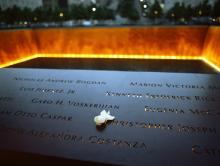
It’s been 14 years since our government declared war on terrorism. How are we doing? It feels like a disastrous game of Whack-A-Terrorist, doesn’t it? We kill one terrorist hiding in one hole, and out pops another one from another hole. Now we are facing the newest threat, a terrorist organization seeking to set up a nation-state, ISIS or IS, as its leadership prefers to be called. The Islamic State, at least, would be a concrete opponent. If they hold on to territory and establish a functioning government, we could at least declare war on a tangible target. Though regrettable it would at least make sense within the logic of war in which states fight other states.
In a recent article for Patheos.com, David French uses Christian Scripture as a justification for “responding to ISIS with wrath and vengeance.” French is a lawyer, a captain in the U.S. Army Reserve and senior counsel at the American Center for Law and Justice. He claims that, according to the Apostle Paul’s letter to the Romans, while individuals are called upon to love their enemies, there is no such call placed on governments. In fact, God has instituted governmental authority in order to execute his wrath against evildoers. And apparently, or so Romans 13 puts it according to French, to know who the evildoers are one simply needs to look at who governments are punishing. French quotes the relevant passage, Romans 13:3-5:
For rulers hold no terror for those who do right, but for those who do wrong. Do you want to be free from fear of the one in authority? Then do what is right and you will be commended. For the one in authority is God’s servant for your good. But if you do wrong, be afraid, for rulers do not bear the sword for no reason. They are God’s servants, agents of wrath to bring punishment on the wrongdoer. [Emphasis added by French.]
French concludes that American Christians should have no difficulty determining the correct response to ISIS. Why? By the fact of determining that justice must be executed against ISIS, our government has determined that their violence is not only an offense against American citizens (he names the beheading victims, journalists James Foley and Steven Sotloff) but against God himself.
French’s analysis strains credulity. Doesn’t he realize that the Romans to whom Paul was writing were themselves victims of government persecution? Does he think that these persecuted Christians felt they were being justly punished? And what about Paul himself, a Roman citizen who was persecuted and executed by the Roman government? Doesn’t French realize that by his own argument, the Roman authorities were executing God’s judgment against Paul? And by his own analysis, French is a captain in a military force that is from its origins a justifiable target for God’s wrath. Why? Because the founding act of the United States was a rebellion against a government, and “whoever resists authority resists what God has appointed, and those who resist will incur judgment.” (Romans 13:2)

Alarm and outrage has been growing over the mounting humanitarian crisis in Iraq at the hands of the Islamic State (IS) also known as ISIL (Islamic State of Syria and the Levant) or ISIS (Islamic State of Iraq and Syria).
Christians in the region are being forced to convert, pay tribute or die as the al Qaeda breakaway group sweeps into predominantly Christian villages and Hamlets in Iraq, sending tens of thousands fleeing for their lives. Other non-Muslim groups, in particular the Yazidi, who practice a faith that predates Islam, are reportedly considered as infidels by the fanatic Islamic State and targeted for extermination in what many are calling a genocide. The U.N. is still gathering numbers but it believes that hundreds of Yazidis have been killed while others, primarily women, have been abducted and taken into slavery. Around 40,000 Yazidis have fled into the mountains of Northwest Iraq where they face the prospect of starvation on mountain or massacre by the Islamic State militants below.
The news is devastating and overwhelming. The suffering and acts of brutal violence staggers the imagination. What would a nonviolent response look like?
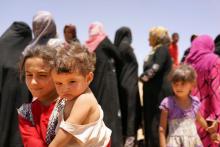
The horrible human costs and increasing danger the world is now facing in Gaza, Ukraine, and Iraq show the consequences of not telling the truth. And unfortunately, we seem to mostly have political leaders who are unwilling to admit the truth of what’s happening, deal with root causes instead of exploiting symptoms, and then do everything possible to prevent the escalation of violence and further wars. Instead we have politicians who are mostly looking for opportunities to blame their political opponents, boost their own reputations, and protect business interests. As people of faith, we are called to speak the truth in love.
It’s time for some truth telling.
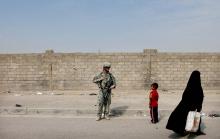
America is stunned by what is happening in Iraq right now, and happening so quickly. We may be facing the worst terrorist threat to international security so far — despite all we have done and sacrificed. Both our political leaders and media pundits are admitting there are no good options for the U.S. now. But there is an option we could try for the first time: humility. Let me turn to two biblical texts that might provide some wisdom for both the religious and non-religious.
If your enemies are hungry, feed them; if they are thirsty, give them something to drink; for by doing this you will heap burning coals on their heads. Do not be overcome by evil, but overcome evil with good. (Rom. 12:20–21)
Blessed are the peacemakers, for they will be called the children of God. (Matthew 5:9)
All nations use propaganda to tell half-truths and spread misinformation about their enemies, which should be honestly challenged. Even so, it is also true that we have real enemies in this world, as individuals, groups, and nations. To assume otherwise is foolish, from the perspective of history, certainly, but also in light of good theology about evil as part of the nature of the human condition. According to the Bible, even our faith communities will encounter enemies. Jesus’s teaching assumes that we will have enemies, and he teaches us how to treat them. In the passages above, Jesus and Paul the Apostle offer guidance for more effective ways of dealing with our enemies. It seems to be clear that our habit of going to war against them is increasingly ineffective. For the past several years, we have found ourselves in a constant state of war with “enemies” who are very hard to find or completely defeat.
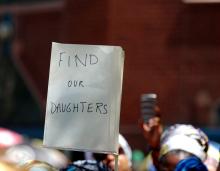
The brutal abduction of several hundred Nigerian schoolgirls has stunned and outraged the world. A violent organization called Boko Haram, and its leader Abubakar Shekau, took credit for the kidnapping more than 300 female students from their classrooms at gunpoint, from a government-run school in Chibok, on April 14. In his subsequent video, the smiling terrorist leader told the world they would sell the teenage girls “into the marketplace” or forced marriages; in his latest, he claims the girls have converted to Islam. Shekau has claimed that God told him to do all of this. That is a lie. It is an abomination. It is a blasphemy against God, and people of faith from all traditions should denounce his words.
Invoking the name of God to justify human barbarity is a painfully tragic and an ongoing occurrence. If hearing these lies about God breaks our hearts, we can only imagine they must also break the heart of God. As the Qur’an warns, “Who is more unjust than he who lies against God?” This kind of blasphemy often derives from extreme religious fanaticism that can be found in all of our faith traditions — those who pervert, abuse, and use the language of religion for fear, hate, and power. These self-proclaimed religious leaders must be utterly denounced as false and human abominations of religion and must be publically condemned and held accountable by faith communities around the world.

On May 21, the National September 11 Memorial and Museum in New York is scheduled to release “The Rise of Al Qaeda,” a seven-minute film telling the story of the attacks. Full disclosure: I have not watched the film.
Here’s why the 9/11 museum should drop these terms from the film.